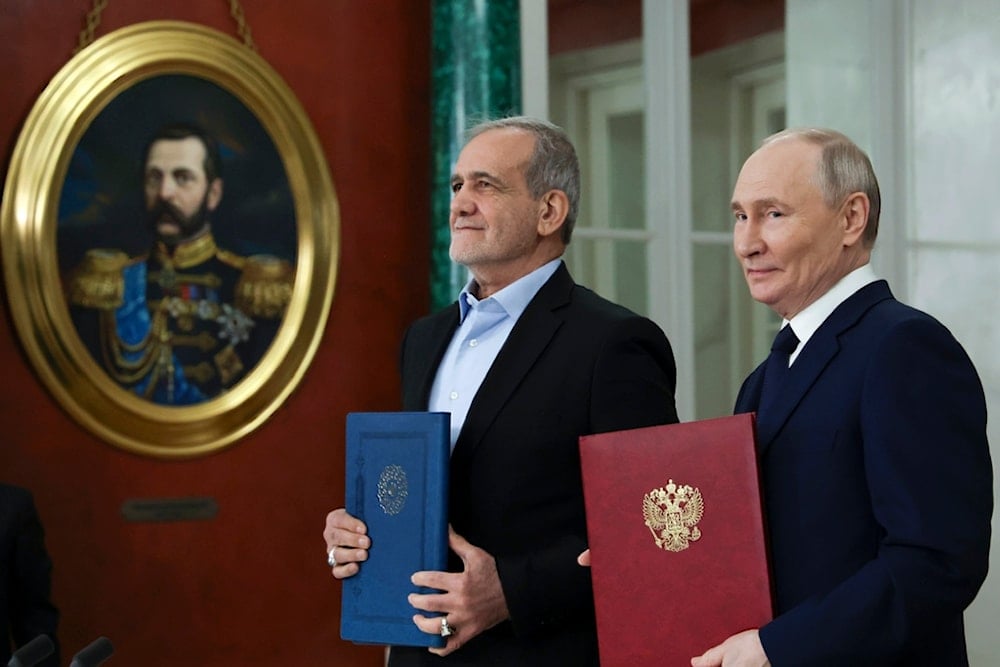Key takeaways from the Russia-Iran Comprehensive Partnership
A significant development under the agreement is Russia's plan to supply up to 55 billion cubic meters (bcm) of gas annually to Iran.
-

Russian President Vladimir Putin, right, and Iranian President Masoud Pezeshkian attend a signing ceremony for a partnership treaty to deepen their ties after their talks at the Kremlin in Moscow, Russia, Friday, Jan. 17, 2025. (Vyacheslav Prokofyev, Sputnik, Kremlin Pool Photo via AP)
Following the signing of the Comprehensive Strategic Partnership Agreement, Russia and Iran have revealed the specific areas of cooperation outlined in the treaty, reaffirming their commitment to strengthening bilateral ties across multiple domains.
Trade and Economic Cooperation
The agreement emphasizes the expansion of trade and economic relations. Coordination will be managed through the permanent Russian-Iranian commission on trade and economic cooperation, reflecting both nations' dedication to enhancing their economic partnership.
Notably, trade between Russia and Iran increased by 14.7% in the first nine months of 2024, reaching $3.3 billion, according to TASS. A remarkable 96% of this trade was conducted using their respective national currencies, showcasing efforts to reduce reliance on the US dollar.
Read more: Russia-Iran trade surpasses $4 bln with 96% in national currencies
Energy Collaboration
A significant development under the agreement is Russia's plan to supply up to 55 billion cubic meters (bcm) of gas annually to Iran. President Vladimir Putin indicated that initial deliveries would start with smaller volumes of up to 2 bcm, eventually scaling up to 55 bcm per year, as quoted by Reuters.
Military-Technical Cooperation
In the defense sector, the treaty places a strong focus on military-technical cooperation, which is described as a critical component of global and regional security.
The document states, "Within the framework of a comprehensive, long-term and strategic partnership, the contracting parties reaffirm their commitment to develop military-technical cooperation on the basis of relevant agreements between them, taking into account mutual interests and their international obligations, and consider such cooperation as an important component of maintaining regional and global security."
Joint Military Drills
Additionally, the agreement calls for joint military drills, to be conducted on each other's territories or beyond, as agreed.
These exercises aim to enhance coordination and operational readiness, all while complying with international legal norms.
Other military provisions include vessel visits, exchanges of personnel, participation in defense exhibitions, and collaborative maritime operations such as anti-piracy missions and search-and-rescue activities.
Space Exploration
Beyond defense, the treaty expands collaboration into space exploration, with both countries agreeing to share knowledge and expertise for peaceful purposes.
The document affirms their intent to "expand interaction, exchange of views and experience in the sphere of research and space exploration for peaceful purposes."
Arms Control
The treaty also includes a shared commitment to arms control, disarmament, and non-proliferation efforts.
Regular consultations on these issues will take place, reinforcing both nations' alignment within international frameworks.
Read more: Iran ready to hold constructive nuclear talks: Araghchi
Mutual Support
Lastly, the agreement reflects mutual support for each other's roles within international organizations and a rejection of using their territories to aid separatist movements.
The document reaffirms the importance of territorial integrity and sovereignty in their partnership.
Russia, Iran to Refrain From Joining Third-Party Sanctions Against Each Other
According to the comprehensive strategic partnership agreement between Russia and Iran, both nations commit to refraining from participating in sanctions imposed by third countries against one another and ensure the avoidance of unilateral coercive measures.
"The contracting parties shall refrain from joining unilateral coercive measures or supporting such measures by any third party if such measures affect or are aimed directly or indirectly at one of the contracting parties, natural and legal persons of such contracting party or their property under the jurisdiction of such third party, goods originating from one contracting party intended for the other contracting party, and (or) works, services, information, results of intellectual activity, including exclusive rights to them, provided by suppliers of the other contracting party," the document read.
The agreement states that both countries will reject the use of unilateral coercive measures, viewing their implementation as a violation of international law. Furthermore, Russia and Iran have committed to consulting and collaborating within international organizations on global and regional matters, as outlined in the treaty.

 4 Min Read
4 Min Read








